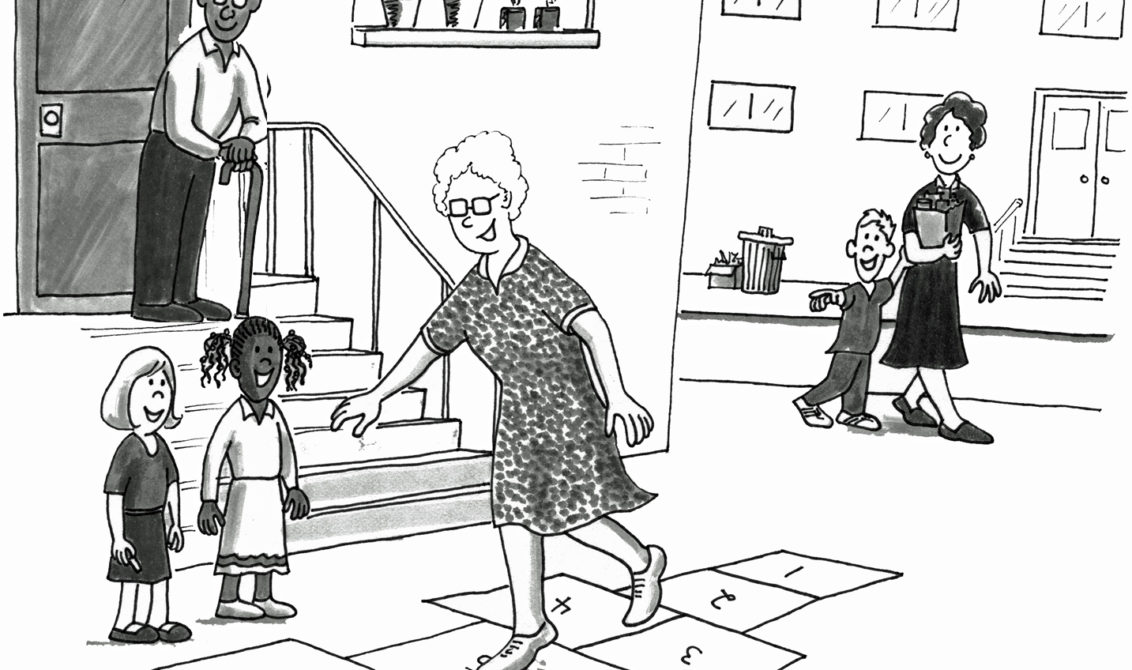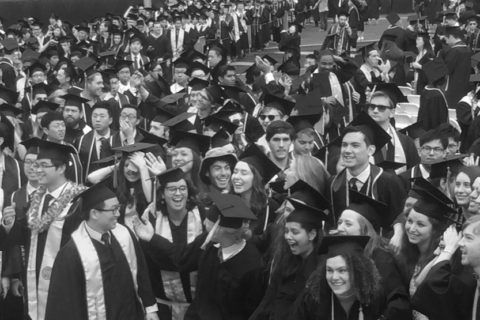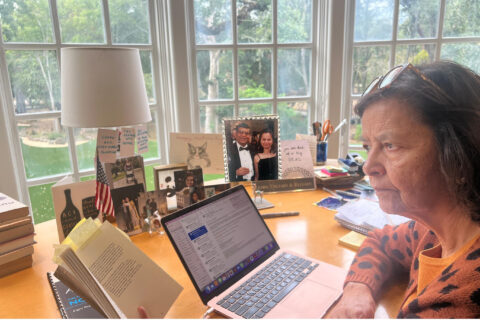
I turn 70 next year. I’ve already noticed a significant hearing loss. With a couple of treatable chronic illnesses, that will not go away but are non-life impacting, I now carry pills. Also, it is harder to put on a sock while standing on one foot. However, my mind is still ready to tackle new challenges, like learning to play bridge and winning three championships after the age of 60.
Yet, the path to old age appeared daunting, until seven months ago, when I met Kevin, my Lyft driver.
Kevin’s mother had died rather early, which had drawn him towards healthcare, about which he wrote a book. He said he had concluded, “human bodies are built to last 250 years!” Kevin was born in the US, and was part Japanese and part American Indian. He believed in a healthy lifestyle — drank matcha tea and “ran up the hill” a few times a day. He was 64 but looked 20 years younger.
However unreal Kevin’s words sounded, they have stayed in my head. I now ask myself: if I still have two-thirds of my life ahead of me, how would I think and live?
When I was 35 I started coloring my hair, and I needed contact lenses for driving. That was depressing. Today I need no contact lenses to see into the distance, and enjoy how my hair looks with highlights. At 45, caffeine late in the day started keeping me awake at night, but now I can have a cup of tea in the evening and then sleep like a baby. At 55, I started getting back aches but core-building exercises have alleviated my lower back pain, which got me into physical fitness.
Even though some earlier health issues related to aging turned out to be non-permanent or I could minimize their impact, the fact that this is not the beginning of the end, did not sink in till I started thinking of Kevin’s words, almost daily. I realized that I needed a new mindset to live a long productive life.
Then Adam Gopnik’s New Yorker article, “Younger Longer” introduced me to George Church’s research. A professor of genetics at Harvard University, Church believes that there is “no upper limit to human age.” He claims that through CRISPER tool for editing DNA, it is possible to edit out aging genes — significantly increase human lifespan.
US life expectancy in the last 100 years has increased by 60% and expected to go up. It is not unimaginable that humans would live up to 150 years. Aging is a phenomenon that cannot be denied but its definition has changed. Humans can overcome physical challenges and thrive – we are all familiar with Helen Keller as a celebrated author and activist for the blind. We should also achieve new heights and thrive until late-age.
This requires new strategies and wisdom to combat the side effects of getting physically old.
Mentally, older people are considered wiser. The median age of Nobel laureates, tend to be well in their 50s and 60s which was the life expectancy in 1900. Our culture already equates wisdom to the ‘Wise Old Man’.
Also according to Harvard Health, brain imaging reveals that the aging brain grows additional connections to become better at capturing the big picture — “perhaps the foundation of wisdom”.
As we grow older, we can better connect the dots of experiences: we combine idealism with pragmatism; we stop striving for platitudes and start doing the right things; and we become more contemplative and less impulsive, delivering better results.
One generation today is experiencing two generations of evolutionary progress due to longer life spans. But if we can stay productively engaged throughout, it can have a compounding effect on human progress.
The walls of aging that we create around ourselves must be moved out into a distant horizon. New goals and aspirations must be set to shed light on the productive, purposeful years, laying ahead. We need to create our own full-lives in addition to being parents or grandparents. We could be the providers rather than seekers who need to be taken care of in old age. This will reduce the economic and emotional burden on the next generation and on society, at large.
Today 40-year-olds are frightened by the idea of death and how they might process their emotions. At 60, we reluctantly warm up to it and start absorbing retirement messages coming at us. This starts us on a declining path when we might just be at half-life.
Today’s professionals should expect many more professional inflections in career due to changing market environment but also because of our evolving capabilities. It is difficult for successful CEOs or executives to imagine taking experientially interesting lesser jobs, later. But working and tough pursuits keeps us engaged and on our toes at any age.
A year ago, I faced my 91-year-old mother’s peaceful death and started setting expectations of my mortality, till I met Kevin. Kevin triggered the trajectory of aspirational living to the end — not just productive.








Ramesh Yadava
Dear Vinita, your article triggered a thought in my mind. I always tell my grand kids that I will be around to see your kids children getting married.
Who ever thought the evolution of wireless communications evolving from 1G to 2G, 3G, 4G, now 5G and going strong. Human life is also progressing in same way. Our average life of 5G is within site the time is not far away when we will be playing soccer with our fifth generation.
We have to work at it. The best gift we can give to our kids and grand kids is our good health, taking care of ourselves, and that will surely pave a path to play soccer with 5th generation.
Madhu
Thank you for writing this inspirational piece.
Let us also consider growing emotionally stronger and wiser as many relationships will die, end or wither. It is important that we let go and stop mulling over why and why to me for the aspirational growth that you talk about. Optimistic outlook will propel us in such a quest.
vinitagupta
Fully support your views.
Arun
Good stuff, Vinita!
A refreshingly new perspective..
Vijay Gupta
Hi Vinita,
I like the tone of optimism in your post. And certainly one should be optimistic about future regardless of age.
However, it is very easy to fall for the world of fantasy created by anti-aging researchers. It is in their job description to promise us the moon, or should I say the Mars. When Kevin talks about a life span of 250 years, it is okay because we don’t take him literally at his words. But when someone like a Harvard Professor talks about “editing out aging genes,” I wonder what he is talking about. Anything is possible in future (say, in a thousand years), but right now nobody knows what those aging genes are, whether such genes even exist, how to edit them out, and what other side effects will such editing have. Moreover, even a simple trial of such gene editing could take a 100+ years assuming it succeeds (which is unlikely in the first few trials).
Many people don’t know that the life expectancy (LE) in the US has been declining recently. It declined steadily from 78.9 years in 2014 to 78.6 years in 2017. And the preliminary data from 2018 does not look much better. It seems likely that the LE in 2020 will be no better than what it was in 2010 (78.7 years). Note that the LE for Asian Americans, including Indian Americans, is higher at about 86 years, probably because of their higher education and income levels.
The reasons for the increase in LE in the 20th century are misunderstood. In fact, the LE for a 5-year old in the UK in the mid-Victorian period (1850-1880) was approximately 75 years, not far from where we are today. The main improvement that medicine made in the 20th century was by reducing infant mortality from infectious diseases. However, there is not much room for reducing infant mortality any further.
If current trends continue, it is even possible that our children will face a shorter LE than us. But that is speculative. As they say, it is very hard to make predictions, especially about the future.
Vijay Gupta
vinitagupta
Unnatural-deaths was one of the reasons. Whether our LE can be extended indefinitely or not, we have to live as if it will be, until it is not. Thanks for enlightening the readers.
Murthy Divakaruni
An excellent, thought provoking write up on Aging. Next year, I too will hit the 70year mark and this article is very timely. I will share it with my college class mates all of whom would benefit from this article. Thanks Vinita.
Regards
Murthy
R. Paul Singh
Very well put. I still don’t know if 150-200 years of age is a good thing in the end with earth’s resources already dwindling
Ujjal Kohli
Was reminded of this article I had read:
https://www.businessinsider.com/what-age-are-people-happiest-2017-12
“Researchers have measured when people are the happiest with their money, their looks, and their lives.
Most people reported their highest levels of happiness in their late 60s and older.
People were the least happy in their 50s.”
Ujjal
Amjad Noorani
Great insights and very well expressed. I am fortunate and blessed to have an attitude like Kevin’s even with a ‘chronic’ malady (type 2 diabetes). Simplifying life and maintaining a balance between acceptance and challenging the minor changes that come with normal years of living have been working for me.
Retiring from a demanding health profession at an early age of 53 has given me the pleasure of enjoying life my way .. with an active and creative lifestyle. Service to a cause also keeps one young and I am blessed in that regard as well.
It’s a balance of quality of life and number of years. Staying fit keeps one ready to be of help to others. I am truly blessed and living an idyllic life at almost 73. Love and Peace…
vinitagupta
Great Story.
Ranjana
Hi Vinita. Age is just a number. Your article is good. I also don’t feel like 58. I read all the articles related to it. I do pranayam daily and I am fit. Would like to hear from you more.
Serena Gupta
I love this article! I’m 26 and constantly worry about these types of things and inspires me reading these articles and seeing you frame life in such a positive, inspiring way!
vinitagupta
Glad to hear that my 26 yrs old, can relate to it.
Vijay Gupta
Here is a more conventional Indian perspective on aging, interpreted and explained by Arthur Brooks, an American author and social scientist. This is published in the July 2019 edition of The Atlantic. Like most articles in The Atlantic, it is very long and well-written. Read slowly and enjoy.
https://www.theatlantic.com/magazine/archive/2019/07/work-peak-professional-decline/590650/
Krishna Veni Balla
GOOD. THANK YOU FOR YOUR LOVE AND AFFECTION towards senior citizens.
Asha
To me age is a number and nothing more. If each human being (approaching 8 billions world population) lived 250 years or so, there are not enough natural resources to feed them, medicines to treat and land for them to live on.
vinitagupta
I am not a proponent of long or short life but would hope to live aspirationally till the end.
Veena Jhawar
I think it was Mark Twain who said “Age is an issue of mind over matter. If you don’t mind, it doesn’t matter.” So what if our looks begin to fade, we have to allow our inner beauty to shine through ( a good foundation and concealer helps too).
I like the optimism in your writing, Vinita. No one knows what the future holds but we can continue to learn and grow. I truly follow this mantra and maintain my enthusiasm and curiosity to learn. I always keep an open mind and am willing to change with the times. I will admit that I have to remind myself to always eat healthy and exercise but I am always exercising my mind and still love to take on a challenge.
The age I am is not the age I feel and this disconnect is not uncommon. In a 1995 study of Americans between 55 and 74, most of them felt 12 years younger than they actually were. Feeling younger than your age has a positive effect on confidence and cognitive abilities and may be one of the reasons of the increasing longevity of the human race.
I am so ready for a good game of bridge or scrabble!
vinitagupta
A beautiful quote indeed.
R K Agarwal
Very thought inspiring article for all of our age. It very well drives the point ” Never Ever say It’ s Over”. Keep the flame of aspirations burning forever…